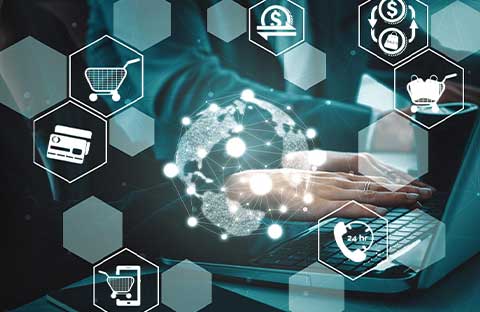Technology’s Role in the Halal Industry: From Blockchain to E Commerce
The halal industry is no longer just about food. It’s about how the food was sourced, how it travelled, how it’s certified, and who verified that certification. And as consumer expectations shift, technology is stepping in to answer the growing demand for transparency, trust, and traceability.
As ASEAN chair for 2025, Malaysia is in a unique position to shape conversations around halal innovation and drive regional cooperation. Through platforms like MIHAS, we’re not just observing the changes; we’re inviting the world to be part of it.
Let’s break down how technology is reshaping halal and why it matters now more than ever.
Trust is Now a Tech Question
The halal label once relied heavily on manual inspections and paper-based certification. But with supply chains growing more complex and cross-border, that system is no longer enough. Consumers want to know more than just whether something is halal; they want to know how it was made, where it came from, and who approved it.
Blockchain offers a way to store that information in a secure, tamper-proof system. In Indonesia, for example, the Halal Product Assurance Organising Agency (BPJPH) is already looking into blockchain to monitor halal certification processes more efficiently. Blockchain allows each step in a product’s journey—slaughtering, packaging, shipping—to be recorded in a way that cannot be edited later. The idea isn’t just to digitise paper trails but to rebuild trust in a system where verification can sometimes be unclear.
Malaysia’s own Halal Development Corporation (HDC) has been actively exploring digital certification processes as well, recognising that exporting to global markets requires halal verification that meets both Islamic requirements and modern trade standards.

E Commerce Meets Ethical Consumption
The pandemic accelerated online shopping across every industry, and halal is no exception. Platforms such as OneAgrix, an international B2B halal e marketplace, have shown that there’s real demand for curated, traceable halal products online. But it’s not just about buying, it’s about filtering products by certification body, origin, and even the type of halal standard applied.
This is especially relevant in Southeast Asia, where the halal economy is deeply embedded into daily life but varies significantly in regulation and practice across countries. Malaysia, with its globally recognised halal certification standards, can offer a central reference point for consistency and quality.
At MIHAS 2025, we anticipate strong interest in digital platforms that connect halal producers to regional and global buyers. These are not just marketplaces; they are networks for knowledge sharing, halal logistics, smart warehousing, and traceable exports.
Tech in the Service of Authenticity
A recurring issue in halal trade is authentication. Mislabelled or fraudulent halal products do not just break religious guidelines; they break trust. To counter this, we are seeing the growth of QR code-based certification systems that allow consumers to scan and instantly access a product’s entire certification history.
AI is also being tested in meat classification and even in monitoring abattoir procedures through video analytics. These technologies do not replace human oversight; they enhance it, offering scalable tools to supplement regulatory compliance.
For businesses, this is a game-changer. Instead of relying on a single certificate buried in a shipment’s documentation, exporters can link every product unit to a real-time certification trail. That is where halal logistics providers are starting to shine, offering end-to-end cold chain traceability with digital monitoring.
Halal Finance Powered by Fintech
The halal economy does not end at consumption, it extends to how businesses are financed. Islamic fintech is making it easier for halal SMEs to access shariah compliant funding options, digital banking, and peer to peer lending platforms.
Take Malaysia’s Ethis Group, one of the region’s first regulated Islamic crowdfunding platforms, or the work being done under Bank Negara Malaysia’s Financial Sector Blueprint 2022 to 2026, which includes provisions for strengthening digital Islamic finance.
This intersection of fintech and halal entrepreneurship will be a major talking point at MIHAS 2025, particularly for SMEs looking to scale across ASEAN and beyond without compromising religious or ethical values.
What to Expect at MIHAS 2025
MIHAS has always been more than just a trade exhibition. It is where innovation meets certification, where exporters meet standards, and where tradition meets technology. As Malaysia chairs ASEAN in 2025, MIHAS 2025 will serve as a regional hub for exploring how halal innovation can be harmonised and expanded across borders.
For exhibitors, MIHAS 2025 offers access to a global audience actively seeking halal-certified products, services, and tech-driven solutions. It is a chance to demonstrate credibility, expand distribution, and forge international partnerships, especially through programmes like the International Sourcing Programme (INSP) and Industry Zone, both of which are designed to connect halal suppliers with serious buyers and collaborators.
For visitors, MIHAS 2025 is where you can explore the entire halal value chain, from agri-based products and food tech to modest fashion, pharmaceuticals, and Islamic finance. Whether you are a policymaker, tech founder, academic, or curious consumer, this is where the latest developments in halal integrity and innovation are on full display.
A Regional Future Built on Digital Integrity
As ASEAN's chair, Malaysia is in a prime position to encourage regional standardisation, not through uniform rules but through shared platforms, tech adoption, and partnerships. Technology is not replacing tradition; it is preserving it in a way that meets the expectations of modern, informed, and global consumers.
From blockchain-powered transparency to AI-enhanced compliance, the halal industry is undergoing a quiet but fundamental shift. And the best place to see it all unfold is MIHAS 2025.


